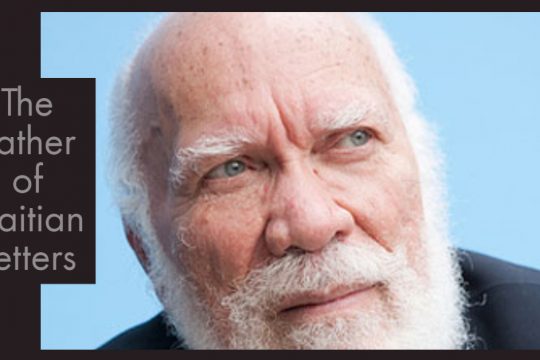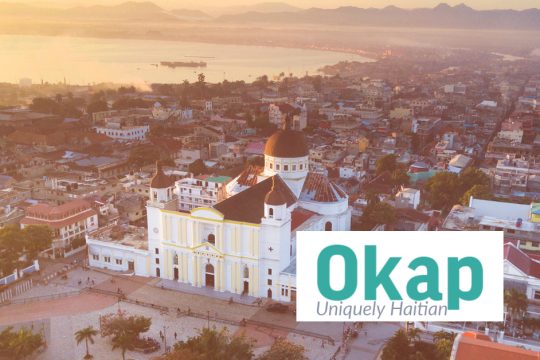Healthcare workers have always been overworked and underappreciated, but with the current Covid-19 crisis, that is true now more than ever. Doctors, nurses and hospital staff all over the world are currently working through a chaotic haze of fear and uncertainty, putting their health and the health of their families on the line in order to protect ours. For this and more, they deserve our endless gratitude.
Let us take this time to appreciate and celebrate three Haitian healthcare heroes.
When we think of medical workers, we often immediately think of the people we directly interact with whenever we are sick. Doctors, nurses and their aides. We often forget the engineers and medical researchers that provide them the tools they use in their care.

Born in Haiti, Dr. Gerard A. Alphonse is a well-respected engineer, physicist and medical researcher known for his major contributions to the medical imaging technology we use today. Dr. Alphonse graduated from New York University in 1958 with a Bachelor of Sciences degree and in 1959 with a Master of Sciences degree. He went on to become a member of the technical staff at the David Sarnoff Research Center in Princeton, New Jersey and received a Ph.D. in electrophysics from the Polytechnic Institute of Brooklyn in 1967.
In 1986, he invented the world’s highest performance superluminescent diode. This device is still currently used in many ways, most notably in optical coherence tomography (OCT), a high-resolution imaging technology used to measure retinal thickness. This testing is now a standard of care which allows for early detection of retinal diseases and conditions. Dr. Alphonse was appointed president of the United States division of the Institute of Electrical and Electronics Engineers for 2005 and currently holds over 60 patents worldwide.
Another area of medical research, and one you might have heard a lot about recently, is Epidemiology. Epidemiology is the study and analysis of health and disease in defined populations. These scientists and medical researchers are often at the forefront of a pandemic, working hard to develop vaccines and determine the causes and patterns of the disease. Social epidemiologists, while very similar, focus more on the population itself and what effect society has on health and disease.

Dr. Linda Marc-Clérismé is the published social epidemiologist that worked to dispel harmful myths about Haitian immigrants. Born in Queens, New York to Haitian parents, Dr. Linda Marc received a Doctor of Sciences degree from the Harvard School of Public Health, a Master of Public Health from the Yale School of Public Health and Bachelor of Arts in Psychology from St. John’s University (New York). Her areas of study are HIV/AIDS and mental illness in Haiti, and in her research was used to challenge a horrible myth that Haitian immigrants were more likely to carry HIV/AIDS than any other population. The study found that large discrepancies between the US census Haitian population estimates and the Haitian Consulates population estimates were to blame for the inaccuracies. Dr. Linda Marc currently works as an education director at the Harvard School of Public Health, and continues to conduct research on minority health issues.
While the sciences and scientists behind healthcare are important and endlessly fascinating, we must not forget those who put their hard work into practice, and care for us face-to-face.

Dr. Rose Marie Toussaint is a prominent physician and a published author with a fascinating story to tell. She received her Doctorate of Medicine from Howard University in 1983 and worked for the hospital until 1997, when she left to write her autobiography. Her autobiography, Never Question the Miracle: A Surgeon’s Story, describes growing up in Haiti and meeting a vodou priest who prophesied that she would grow to be a renowned physician, and continues to chronicle her life from her arrival in Miami as a teenager to her role as a chief surgeon for the liver transplant center at Howard University Hospital. She founded the National Foundation for Transplants in 1983, a fund designed to help with costs for live-saving transplants for patients in need. She currently works in private practice, focusing on holistic treatments and prevention.
From the epidemiologists working tirelessly to develop a vaccine, to the courageous doctors and nurses on the front lines, to the engineers providing them life-saving personal protective equipment- all of these people deserve our utmost thanks and appreciation, not just now, but always. They work to keep us safe, keep us healthy and to keep us alive. So, wash your hands, stay inside, and spare a thought for the heroic medical workers during this epidemic that aren’t able to do the same.
Let’s explore some COVID-19 vocabulary
Discussing COVID-19
| English | Haitian Creole Translation |
| To fall ill, to get sick | Tonbe malad |
| Flu | Grip, Lagrip, grip sezon |
| Cold | Rim |
| Fever | Lafyèv
Fyèv |
| Wash your hands | Lave men ou |
| Wash your face | Lave figi ou |
| Take your medicine | Pran medikaman ou
Pran remèd ou |
| Hospital | Lopital |
| Doctor | Doktè |
| Nurse | Enfimyè |
| Face mask | Mask pou figi |
| To cough | Touse |
| Cough | Tous |
| Dry cough | Tous sèk |
| Shortness of breath | Souf kout |
| Sneeze | Estène |
| Infection | Enfeksyon |
| Virus | Viris |
| Prevent | Kwape
Anpeche |
| Outbreak | Eklatman |
| Epidemic | Epidemi |
| Pandemic | Pandemi |
| Isolation | Izolman |
| Confinement | Konfinman |
| Quarantine | Karantèn |
| Vaccine | Vaksen |

Marleen is a Haitian Creole translator and Language Advocate. After completing her Graduate Studies at the Institut d’Etudes Politiques de Paris (SciencesPo), she decided to launch Creole Solutions to focus on her mission to promote Haitian language and culture. She worked for the Consulate General of Haiti in Chicago and the United Nations Environment Program in Haiti.
Marleen se yon tradiktris k ap travay pou defann dwa lang. Apre li te fini ak etid siperyè li nan Institut d’Etudes Politiques de Paris (SciencesPo), Marleen te deside lanse Creole Solutions pou konsantre sou misyon li pou voye lang ak kilti lakay monte. Avan sa li te travay pou Konsila Jeneral Ayiti nan Chikago ak Pwogram Nasyonzini pou Anviwònman an Ayiti.







